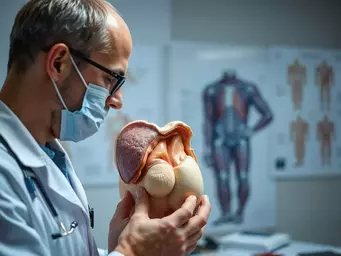Testosterone Therapy Side Effects Guide

Are you aware that testosterone levels naturally decline as men age, often leading to various health challenges? Understanding the nuances of Testosterone Replacement Therapy (TRT) can empower you to make informed choices about your health.
What You Will Learn
- Testosterone Replacement Therapy (TRT) is aimed at addressing testosterone deficiency through various delivery methods like injections, gels, and patches.
- Common symptoms prompting men to consider TRT include fatigue, mood changes, and decreased libido, making early recognition crucial.
- The balance between the potential benefits of TRT and its risks, such as cardiovascular issues and mood changes, is essential for informed decision-making.
- Consultation with a healthcare professional specializing in hormone health is vital for tailoring the most appropriate therapy for individual needs.
Testosterone Replacement Therapy: Benefits vs. Risks & Key Considerations
This visual summarizes the common factors influencing decisions around Testosterone Replacement Therapy (TRT), highlighting its key benefits, potential risks, and important considerations for patients.
Benefits of TRT
- ✓ Improved Energy & Mood
- ✓ Enhanced Libido & Sexual Function
- ✓ Increased Muscle Mass & Strength
- ✓ Better Bone Density
Potential Risks & Side Effects
- ● Acne & Skin Reactions
- ● Mood Changes & Irritability
- ● Cardiovascular Issues (rare)
- ● Prostate Concerns (monitoring needed)
Key Considerations
- ◈ Doctor Consultation & Assessment
- ◈ Individualized Treatment Plan
- ◈ Regular Monitoring & Follow-ups
- ◈ Lifestyle Factors (Diet, Exercise)
Delivery Methods
- ● Injections (Quick relief)
- ● Gels (Steady absorption)
- ● Patches (Consistent dose)
Understanding Testosterone Therapy: An Overview of Its Purpose and Benefits
When it comes to hormone health, Testosterone Replacement Therapy (TRT) has become a vital topic of discussion. TRT is designed to help men who suffer from testosterone deficiency, a condition that can lead to various health challenges. By understanding the purpose and benefits of testosterone therapy, you can better navigate the options that may contribute to your overall vitality.
At Hypogonadal Health, we believe in empowering individuals with knowledge about their hormone health. Through education, you can make informed decisions that support your well-being and enhance your quality of life!
What is Testosterone Replacement Therapy (TRT)?
Testosterone Replacement Therapy (TRT) involves administering testosterone to men whose bodies do not produce sufficient levels of the hormone. This can occur due to various factors, including age, medical conditions, and lifestyle choices. TRT can take multiple forms, including injections, gels, and patches, allowing for flexibility in treatment options. The FDA has also issued class-wide labeling changes to ensure patients are fully informed about the potential benefits and risks.
- Injections: Administered directly into the muscle, they can provide quick relief from symptoms.
- Gels: Applied to the skin, these allow for a steady absorption of testosterone over time.
- Patches: Worn on the skin, they deliver a consistent dose throughout the day.
Understanding these options is crucial, as they each have different implications for effectiveness and side effects. At Hypogonadal Health, our mission is to clarify these choices so you can advocate for your health with confidence!
Why Do Men Consider Testosterone Therapy?
Many men consider testosterone therapy when they notice symptoms that affect their quality of life. Common reasons include persistent fatigue, mood changes, and decreased libido. Recognizing these signs early can help individuals address potential hormone imbalances before they escalate.
- Fatigue or energy loss
- Reduced sexual desire or erectile dysfunction
- Loss of muscle mass and strength

By asking the right questions and seeking professional guidance, men can explore whether TRT is a suitable option for them. Remember, taking the first step toward understanding your hormone levels is an empowering move!
Exploring Hormone Replacement Therapy: Types and Approaches
Hormone Replacement Therapy encompasses various approaches, all aimed at restoring hormonal balance. Alongside testosterone therapy, other hormones may also need to be addressed, such as estradiol or human growth hormone, depending on individual health needs.
- Bioidentical Hormones: These are chemically identical to hormones produced in the body, offering a natural approach.
- Conventional Hormones: Often synthetically derived, these can effectively manage symptoms but may come with different side effects.
It’s essential to consult with a healthcare professional who specializes in hormone health, like myself, to determine the most appropriate therapy for your specific needs. Our goal at Hypogonadal Health is to demystify these therapies, enabling you to choose wisely for your health journey.
Pro Tip
Did you know? Regularly monitoring your testosterone levels can help you stay on top of your health. By keeping track of your symptoms and discussing them with your healthcare provider, you can make timely adjustments to your therapy and address any concerns before they escalate.
Frequently Asked Questions About Testosterone Replacement Therapy (TRT)
Here are some common questions regarding TRT to help you better understand this treatment option:
What is Testosterone Replacement Therapy (TRT)?
TRT involves administering testosterone to men who have insufficient levels of the hormone, aiming to alleviate symptoms like fatigue, mood changes, and decreased libido. It can be delivered via injections, gels, or patches.
What are the common symptoms that lead men to consider TRT?
Men often consider TRT due to symptoms such as persistent fatigue, reduced sexual desire or erectile dysfunction, loss of muscle mass and strength, and mood changes.
What are the potential benefits of TRT?
Benefits of TRT can include improved energy and mood, enhanced libido and sexual function, increased muscle mass and strength, and better bone density.
Are there any risks or side effects associated with TRT?
Yes, potential risks and side effects include acne, skin reactions, mood changes and irritability, cardiovascular issues (rare), and prostate concerns, which require monitoring. The FDA has issued safety communications regarding testosterone products.
How can I make an informed decision about TRT?
Making an informed decision involves assessing your symptoms, consulting with your doctor to discuss potential side effects and your overall health, and considering lifestyle factors like diet and exercise. Regular monitoring and open communication with your healthcare provider are crucial.
When should I consult my doctor about TRT side effects?
You should consult your doctor immediately if you experience severe headaches or vision changes, chest pain or shortness of breath, or signs of a deep vein thrombosis, such as swelling or pain in your legs.
Summarizing the Key Takeaways on Testosterone Therapy Side Effects
Understanding testosterone therapy is crucial for anyone considering this treatment option. It's important to balance the potential benefits with the associated risks. Here are some key takeaways to keep in mind:
- Common side effects can include acne, weight gain, and mood changes.
- Serious risks such as cardiovascular issues and prostate concerns warrant careful monitoring. A study published in the Journal of the American Heart Association provides further insights into the cardiovascular safety of testosterone replacement therapy.
- Different delivery methods may have varying impacts on side effects.
By being aware of these factors, you can have more informed discussions with your healthcare provider about whether testosterone therapy is the right choice for you.
Balancing Risks and Benefits: Making Informed Decisions
When it comes to testosterone replacement therapy (TRT), understanding the balance between risks and benefits is essential. It's about making informed decisions that align with your health goals. Here are some considerations to help you weigh your options:
- Assess your symptoms: Determine if your symptoms are significantly impacting your quality of life.
- Consult your doctor: Discuss potential side effects in relation to your overall health.
- Consider lifestyle factors: Diet, exercise, and stress management can influence your therapy outcomes.

Taking these elements into account can guide you in making decisions that best serve your health and well-being.
When to Consult Your Doctor: Signs That Require Attention
While many patients tolerate testosterone therapy well, some may experience side effects that warrant immediate medical attention. Recognizing these signs is vital for your health. Here are symptoms that indicate you should consult your doctor:
- Severe headaches or vision changes
- Chest pain or shortness of breath
- Signs of a deep vein thrombosis, such as swelling or pain in your legs
Don't hesitate to reach out! Consulting with your healthcare provider can ensure that your treatment plan remains effective and safe.
Understanding Risk Factors and Safety Profile of TRT
The safety profile of testosterone therapy can vary greatly from person to person. Factors such as age, medical history, and existing health conditions play a significant role. Here are some key risk factors to consider:
- Age: Older men may face higher risks for certain side effects.
- Pre-existing conditions: Conditions like heart disease or prostate issues can complicate therapy.
- Family history of hormone-related cancers should also be discussed with your doctor.
By understanding your individual risk factors, you can engage in informed discussions about the safety and suitability of TRT for your unique situation.
Next Steps: Empowering Yourself in Your TRT Journey
As you navigate your testosterone therapy journey, empowerment through knowledge is key. Here are actionable steps you can take:
Stay Informed: Resources for Ongoing Support and Education
Staying educated about your therapy can significantly enhance your experience. Here are some valuable resources:
- Hypogonadal Health: Our website offers comprehensive guides and articles.
- Healthcare provider resources: Many clinics offer educational materials tailored to TRT.
- Support groups: Connecting with others undergoing similar experiences can be beneficial.
Utilizing these resources will help you remain engaged and informed about your treatment options.
Connect with Healthcare Providers: Importance of Open Communication
Open communication with your healthcare provider is essential throughout your TRT journey. Don't hesitate to ask questions or express concerns. Here are tips to foster effective communication:
- Prepare questions before appointments to ensure all your concerns are addressed.
- Be honest about any side effects or changes in your health.
- Follow up on test results and treatment adjustments.
Creating a partnership with your healthcare provider can lead to better health outcomes and a more tailored approach to your therapy.
Patient Education: Understanding Your Treatment Guidelines
Understanding your treatment guidelines is critical for successful therapy management. Here are some key aspects to focus on:
- Dosage instructions: Follow prescribed dosages carefully for optimal results.
- Monitoring schedules: Stick to regular check-ups and blood tests as recommended.
- Recognize the signs of side effects early on to address them promptly.
By being proactive about your education and treatment, you can significantly influence your health journey for the better!
Recap of Key Points
Here is a quick recap of the important points discussed in the article:
- Testosterone Replacement Therapy (TRT) helps men with testosterone deficiency, improving their quality of life.
- TRT options include injections, gels, and patches, each with unique benefits and side effects.
- Recognizing symptoms such as fatigue, mood changes, and reduced libido can prompt discussions about TRT with healthcare providers.
- Understanding potential side effects and risks is crucial for informed decision-making regarding TRT.
- Open communication with healthcare providers and staying informed about treatment guidelines enhance the TRT experience.
Popular Posts
 What if the key to unlocking your vitality lies in understanding the hormones that influence your bo
What if the key to unlocking your vitality lies in understanding the hormones that influence your bo
 Recognizing that your environment can significantly influence your hormonal health is crucial. Have
Recognizing that your environment can significantly influence your hormonal health is crucial. Have
 Have you considered how fluctuations in your testosterone levels might affect your daily energy and
Have you considered how fluctuations in your testosterone levels might affect your daily energy and
 Trauma to the testicles can have profound effects on hormonal health, but understanding the causes a
Trauma to the testicles can have profound effects on hormonal health, but understanding the causes a
